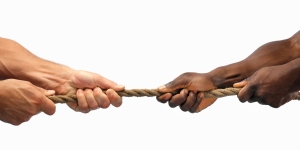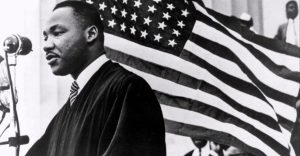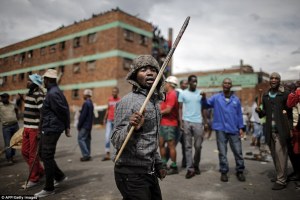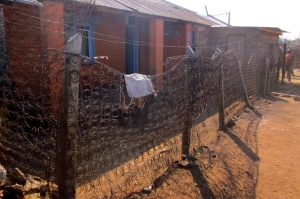It’s human nature to fear what you don’t understand, and what’s different from what you know or who you are. One of the easiest ways to differentiate what isn’t like you is visually: if someone looks like you, they’re safe, if they look different, they’re dangerous. That is the fundamental law of the human psyche that paved the way for racism.

The practice of treating people differently based on their physical appearance is as old as humanity, and after thousands of years of evolution, racism hasn’t dwindled at all. One would think that modern mankind would have transcended a concept so superficial. Why does it matter how someone looks? The content of their character is far more important, yet in all corners of the world, people are drawn to the similar. It makes them comfortable. Different is uncomfortable. I have seen it on every continent and in every country.
In India and Nepal, the caste system classifies people based on their ancestry, pigeonholing them into neighborhoods, jobs, and spouses that the culture deems appropriate.
The majority ethnic group in China – the Han – use social breeding practices to assimilate minority groups into the larger, essentially exterminating the lesser and feeding the larger.
Turks persecute, and in the worst cases murder, the Kurdish people trying to survive and scratch out a living within the borders of that Middle Eastern country.
The various Arab tribes have been at war with each other for thousands of years (not to mention the everlasting jihad against non-believers).
Even in a modern and developed country like Spain, immigrants from the Latin American nations are looked down upon by the indigenous Spaniards.

And if it’s not skin color, it’s religion or gender or sexual orientation. Yes, America is leading the way for the rest of the world regarding these social issues, but even the United States hasn’t been without violence, oppression, and bloodshed because of racism inherent in the human condition. We were one of the last countries to outlaw slavery. And following the Civil War, blacks in the southern states weren’t treated much better than they had been before the war. A century later, the civil rights movement finally made progress in curbing a lot of racism thanks largely in part to the work of Martin Luther King Jr, Rosa Parks, Malcolm X, and other freedom fighters.

More recently, South Africa went through a similar struggle overcoming the statute of Apartheid (legalized racism) within my lifetime. Everyone has heard the name Nelson Mandela. Most are familiar with his role in stamping out the all-white government and winning the ‘94 election that allowed a “one man, one vote” policy giving black Africans a voice for the first time in history. At the time, it seemed like a resounding victory for the minorities and underdogs of the world. But Mandela didn’t seek a second term, and once he passed away, the situation in South Africa didn’t improve. In fact, in the past few years, the political situation in that nation has been steadily growing worse.
International news media has a short attention span; they don’t seem to care about what’s happening in South Africa 20 years after the demise of Apartheid. However, take it from someone who’s been there and spoken to locals on the ground – both black and white… the problems are far from solved. Apartheid is over, yes, but racism runs rampant in South Africa.
Mandela preached peace. He didn’t want the black community to enact revenge on the white South Africans, because he knew that would make the blacks no better off than the whites who had violently oppressed them. It was bad, very bad, for the blacks for generations. I’m not defending the white South Africans in charge from the early 20th century until the ANC (African National Congress) won the election, placing black politicians in office. What has happened in the years since is a travesty unto itself.

There is an exodus happening. White South Africans, fearing for their very lives, are fleeing South Africa by the boatloads. Families who have spent generations in the country are abandoning their homes and businesses, picking up and flying to nations like Australia, New Zealand, and parts of Europe to escape the brutality of the revenge currently being waged by the newly freed black community. In Johannesburg, whites are mugged, robbed, and in worst cases murdered simply because of their skin color. The pendulum has swung the other direction, it seems.
In the more rural communities, white farmers and their families are not only being brutally murdered, but in some cases being skinned alive and strung up in trees. Lynching is the word Americans would use (and some older Americans might remember the horrible days when blacks were lynched at the dirty hands of the KKK and other racist whites). For the 10% of white South Africans, it seems that progress has taken them two steps backward.

The majority of black South Africans aren’t part of the problem. Similarly to Muslims, a few bad apples (as they say) spoil the bunch. I’m not only speaking of educated blacks in the nation. All it takes is a bit of common sense, which some of the poorest of the poor and least educated citizens of Johannesburg demonstrate on a daily basis. On our tour of Soweto (South Western Township – the poorest community in the city – and the ghetto where Mandela and all the Johannesburg blacks were forcibly relocated back in the 1950s-60s), we met a handful of people who cram their large families into two room, tin-roof shacks… people who live on $2.00 a week… people who shunned the violence being carried out against white South Africans and tourists. They know better. So not everyone is to blame.
The issues stem from those who have an inclination toward violence and greed. The have-nots who want to take whatever they want from those who have it. That includes some of the politicians, post-Mandela, who’ve risen to power in the past 5-10 years.

Just to put things into perspective, the current president – Jacob Zuma – is a far cry from Nelson Mandela. In 2005, he was charged with rape. There have been years-long legal battles over his involvement in racketeering and corruption (his financial advisor was convicted for fraud). He opposes same-sex marriage, wants to confiscate the accidental babies of teenage mothers, and believes the ANC will remain in power until the second-coming of Christ.
And last year, the Constitutional Court unanimously decided that Zuma failed to uphold the country’s constitution, calling for his immediate resignation (a failed impeachment attempt followed). And that’s just the dirt on the president, the head of the ruling party! Who knows what other tragedies occur every day in regional and municipal politics.
Here are some racist quotes from ANC leaders in various levels of government:
- “We are not calling for the slaughter of white people, at least for now.” – Julius Malema
- “White people in South Africa deserve to be hacked and killed like Jews.” – Velaphi Khumalo
- “The first people that need to fuck off are whites.” – Kenny Barrel Nkosi
Evidently, the ANC has slid quite far down the rails of ethics since Mandela’s retirement and death. Twenty years after the dissolution of Apartheid, South Africa remains a nation torn apart. Racism is wrong in every direction. It doesn’t matter if those attitudes are from whites toward blacks or from blacks toward whites. We are moving swiftly into the 21st century, and those backwards ideas need to be left in the past.
Tourists are also losing out because there isn’t much worth traveling to South Africa to see. If the violence against Europeans and other white races continues, the nation will definitely see a decline in the revenue from their tourism industry. It’s a no win situation for everyone involved.
South Africans have suffered through tremendous tragedy in the past fifty years (or longer) and it’s time to set aside those difference and start working together, regardless of skin color, to create a more peaceful and prosperous tomorrow.
Until Next Time…
-Justin
Excellent article